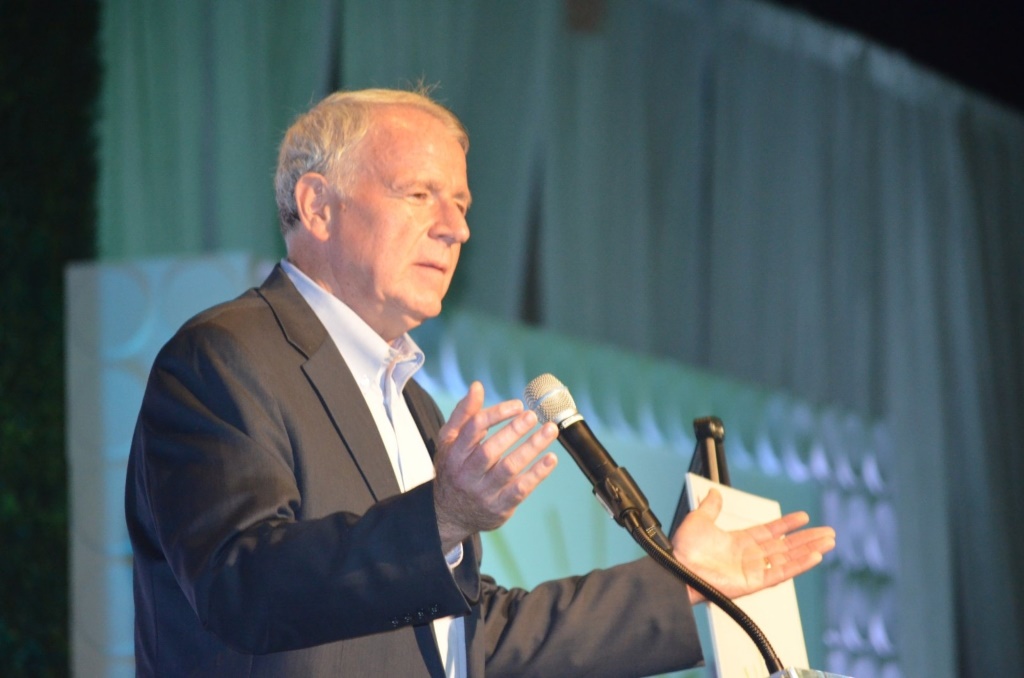Barrett Seeks State Okay for City Sales Tax
Says city budget “not sustainable,” big police cuts certain without new revenue source.
Faced with an ominous budget forecast in the year ahead, Mayor Tom Barrett and other municipal leaders this week are calling on state lawmakers to pave the way for a possible half-cent sales tax increase in Milwaukee.
If officials in Madison back the city’s request, and voters approve the plan in an upcoming referendum, Barrett said the tax would bring much-needed revenue to assist in municipal operations, though relief would not fully come until the 2019 budget — at the earliest.
Republican Gov. Scott Walker, a frequent political foe of Democrat Barrett, would have to ultimately sign off on the sales tax plan for it to even go to referendum.
Barrett and Mark Nicolini, the city’s budget and management director, laid out the rationale for the tax during an otherwise customary budget hearing Tuesday. Under state statutes, the city is required to present a rough outline of next year’s budget before the public each August.
“Local government is simply not a priority for state government,” Barrett said.
A recent Public Policy Forum study found annual state shared revenue to the city had plummeted by $151 million in real dollars since the mid-1990s and concluded the city’s revenue structure is “broken.”
Unlike cities that have other taxes they levy, Milwaukee largely depends on two revenue sources: state aid and property taxes. Barrett is proposing a $21.5 million hike, or an 8.1 percent increase, in next year’s property tax levy, bringing that income source to $285.2 million.
The half-cent sales tax plan would instantly infuse $35 million into the city’s police and fire department budgets, which have faced mounting costs on the expense side of the ledger in recent years.
“The Pac Man that’s eating everything is public safety,” Barrett said. “Unless we have some kind of relief valve, we are going to be very challenged.”
Based on current projections, Barrett said there could be a 84 full-time equivalency reduction in sworn personnel staffing within the Milwaukee Police Department — a figure, he said, that takes into account the proposed levy increase.
If the plan would move forward, MPD’s force across the city would stand at 1,804 officers.
But in a bigger picture sense, Barrett warned steeper cuts could impact the city as a whole if changes are not made in the future.
Several factors — including state limits on how much property taxes can be raised and a need to increase pension contributions — are bringing the budget challenges to a head.
“This is not a sustainable model,” Barrett said.
Several other areas of the municipal budget could face cuts as well, particularly as the city grapples with addressing lead-based service lines and other ongoing budget items.
Nicolini spent time combing through Milwaukee Public Library’s proposed budget during the hearing, which could face $1.1 million in cuts across the system if the proposal moves forward as presented.
“I think we’ll be able to avoid closing any of the neighborhood libraries,” Nicolini said.
But trims could come in the form of staff reductions, cutting operating hours and potentially removing such services as the Teacher in the Library Program, which has served as a mechanism for helping students with homework after school.
Barrett is due to give his official proposed executive budget to the Common Council on Sept. 26.
From there, several council-level committees will comb through the document, line item by line item, and several opportunities for public input will take place.
The full council is slated to act on what likely would be a marked up version of Barrett’s budget Nov. 12. From there, Barrett could veto changes, and a super-majority of the council could subsequently override any of those vetoes.
“We’ve got challenges ahead of us, but they’re challenges we can’t avoid,” Barrett said. “We’ll deal with them.”
Further information on the city’s 2018 budget is available here.
If you think stories like this are important, become a member of Urban Milwaukee and help support real, independent journalism. Plus you get some cool added benefits.
More about the 1 Percent Sales Tax Proposal
- The State of Politics: The Debate Over Local Sales Taxes - Steven Walters - Feb 22nd, 2021
- Evers’ Budget Proposal Would Allow Milwaukee Sales Tax - Jeramey Jannene - Feb 12th, 2021
- WCA Applauds Governor Evers’ Sales Tax Option - Wisconsin Counties Association - Feb 12th, 2021
- MMAC Encourages Support for Evers Sales Tax Proposal - Metropolitan Milwaukee Association of Commerce - Feb 12th, 2021
- Gov. Evers Proposes Plan to Enhance Local Control, Bolster Local Communities’ Economic Recovery - Gov. Tony Evers - Feb 12th, 2021
- The State of Politics: Milwaukee Leaders Plead for 1% Sales Tax - Steven Walters - Mar 16th, 2020
- County Sales Tax Legislation Gets Hearing - Graham Kilmer - Mar 5th, 2020
- ‘Fair Deal’ Sales Tax Referendum Blocked From April Ballot - Corrinne Hess - Jan 30th, 2020
- Transportation: Bauman Wants 1.5 Percent Sales Tax - Jeramey Jannene - Sep 26th, 2019
- Review Board to Discuss Recent Sales Tax Proposal and its impact on Public Transit - Ald. Bob Bauman - Sep 23rd, 2019
Read more about 1 Percent Sales Tax Proposal here






















It’s long overdue.
Kudos to Mayor Barrett for getting out ahead of this. When you’ve got so much money tied up in public sector pensions, streetcars, etc., and the possible loss of Federal funds for being a Sanctuary City, you know you’re going to have serious money problems in the near future. Barrett can see what’s happening in Chicago, with steep property tax increases and fee upon fee, and is progressive enough to know that kind of sharply rising taxation is inevitable for the City of Milwaukee as well.
@WCR
Troll. Troll. Did I mention troll. You know very well Milwaukee is subsidizing the rest of the state. With each passing year, the city gets back less of each dollar it sends off to the state.
I’ve got an idea for you WCR. Let each municpality live off its own local tax base. It would work out very well for Madison and Milwaukee. The rest of the state’s municipalities would be decimated. Just remember who pays the state’s bills.
Adam, you know that every municipality should provide more to the state than it takes in, right? That is what a healthy municipality does. The fact that Milwaukee, until only a few years ago, took in more than it gave, demonstrated how economically strained it was.
@AG
Thats news to me. Other than some administrative costs, all things being equal $1 dollar of tax money collected in an area and sent to the state should come back with $1 of funding in the form of education, transportation projects, etc from the state.
City of Madison residents such as myself see our community only receive back something like $.50 of every dollar that we send to the state. And I’m okay with that. Rural residents and economically depressed communities deserve to have good roads and good education too.
I just want the record to be clear on who are the givers and takers when it comes to the state budget (cause talk radio definitely gets it wrong). And that the state should get out of the way and allow municipalities more flexibility to increase revenue when taxpayers vote in favor of it through referendums. (Like local sales taxes and regional transit authorities)
Adam, it’s true there are a few municipalities that still receive more from the state than they provide, however roughly 90% -ish of municipalities (just eyeballing the DOR data) receive less than they send to the state. Most of which receive far less as a percentage than Milwaukee. It’s just that finally Milwaukee is pulling it’s weight.
The state has a lot of functions to pay for. It’s not a matter of “some administrative costs,” it’s the entire state budget. If most municipalities took more aid than they had in revenue, our state would be bankrupt and would not operate.
(Unfortunately, if you’d like to see the data, I can’t find it online, I have it as an excel file. Bruce Murphy gave the link in the comments section of a previous article. You’ll have to find it yourself or he will have to re-post. Sorry!).
Or maybe it was Bruce Thompson??
Adam, last I looked Madison is doing okay considering the Department of transportation projects in Madison are $50 -`100 million dollars over budget. Madison residents must have the very best. Milwaukee has a locking up black men problem and the State has to pay for Milwaukee’s incarceration problem, so I am not sure how the State owes Milwaukee money.
Urban areas subsidize rural ones. This has been well-documented many times. http://www.startribune.com/urban-rural-split-in-minnesota-grows-deeper-and-wider/289688071/
Blue states also subsidize red ones.
AG…. Milwaukee has bankrolled this state throughout it’s history. The city went through some difficult times in the 80s and 90s, but is redefining itself. Prior to that, Milwaukee built this state. Our suburbs exist and thrive because of Milwaukee… you’re welcome WashCountyRep. Adam is on to something. My fear is that the majority of outstate WI and certain political interests want the city of Milwaukee and Madison to fail. WashCoRepub derives a sense of pleasure at seeing people suffer. The political right needs a villain and its Milwaukee and Madison….. the two cities that make this state interesting.